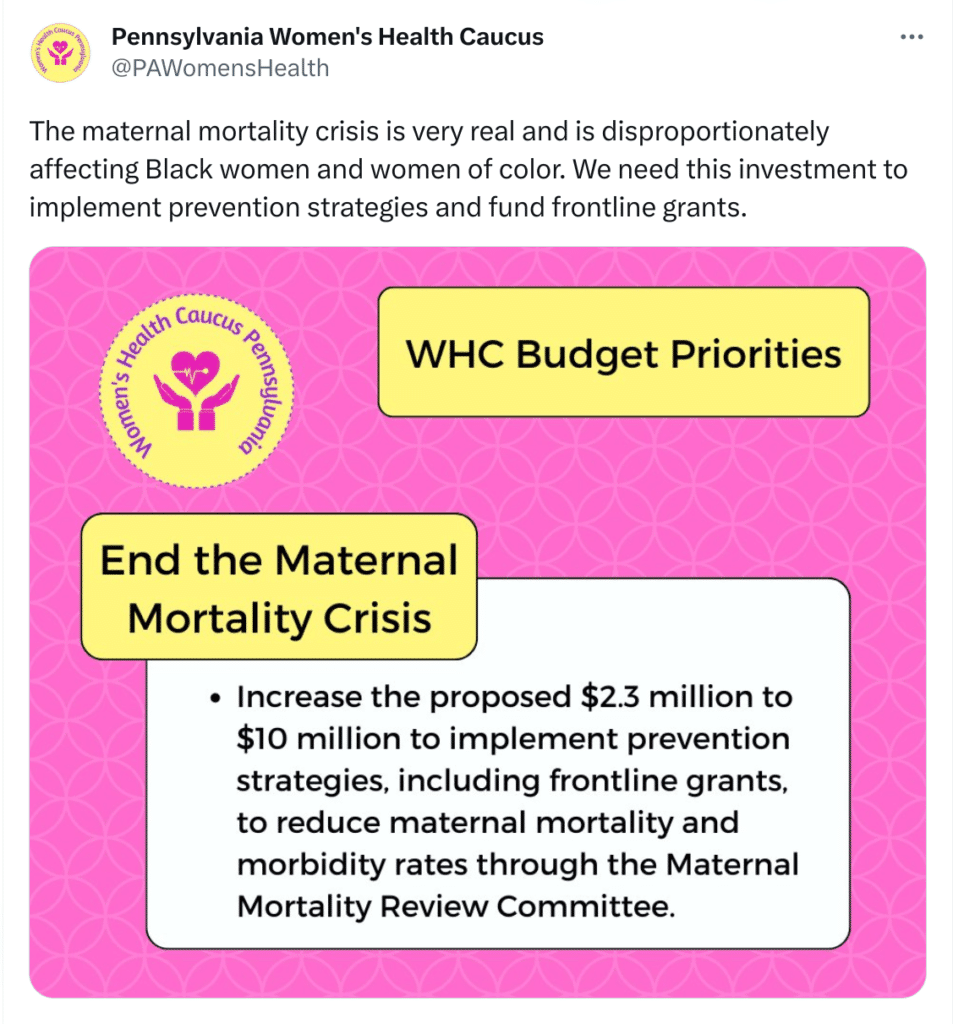If you’re a person thinking of giving birth in Pennsylvania, you might consider moving first. When compared with global maternal health statistics, the odds are against pregnant people in the United States. Worse still for parents and infants in the Keystone State, maternal mortality outcomes here are in the lower half of the nation.
Recently, some Pennsylvania lawmakers have voted to change that. Last month, State Senator Judith Schwank of Berks County brought SB 262 to her colleagues. It passed unanimously on June 13. Not a single member of the Pennsylvania Senate voted against the bill which would change the Maternal Mortality Review Act (more about that later) by adding a reporting requirement to include information from the Department of Health.
“Once we get this data in, we will be able to help set different protocols,” resulting in better outcomes, said Audrey Mindy, policy associate in Senator Schwank’s office. Those changes may incorporate a host of new technologies including better telehealth options for pregnant individuals living in maternal health deserts.
The Pennsylvania Department of Health agrees. In a statement to the Bucks County Beacon, Press Secretary Mark O’Neill confirmed SB 262 “amends the Maternal Mortality Review Act to strengthen the data collection capabilities of the Department of Health to better understand maternal morbidity in Pennsylvania and create evidence-based best practices, interventions, and policy solutions.”
Bucks County Representative Perry Warren looks forward to voting for Schwank’s initiative when it comes before the house this week. During his decades-long marriage, Warren’s wife Elizabeth, a neonatal nurse, would come home from work describing mostly unnecessary, negative maternal health outcomes. He’s enthusiastic and endorses the need to gather data and “raise awareness.” He believes the mandated “reporting will help the legislature seek solutions.”
Commenting the day after Speaker McClinton and other Pennsylvania lawmakers met with Vice President Harris to discuss women’s health, Representative Warren elaborated, “the Speaker has set this as a priority for the House Democratic Caucus. We’ve accomplished quite a bit already this session. We also passed a bill to address maternal health for incarcerated pregnant persons. Unshackling them.”
Referencing the Dignity for Incarcerated Women Bill, HB 900, Warren is excited by the legislative majority’s focus on women.
“We have the first woman Speaker, newly in a position and ready to shift focus. It’s refreshing to have the opportunity to have good legislation receive votes,” said Warren. “Kudos to speaker McClinton for moving bills like these forward.”
McClinton, Schwank, Warren and the bill’s other proponents can expect help getting this work across the finish line.
O’Neill in the Department of Health’s statement went on to align this bill with the health objectives of the commonwealth’s chief executive.
“This legislation further highlights the importance of Governor Shapiro’s budget proposal that would, for the first time ever, invest in studying disparities in maternal mortality and allow the Department to meet the increased data reporting requirements included in the legislation,” he said.
As Speaker McClinton explained to the Bucks County Beacon, “House Democrats are putting people ahead of politics and have advanced dozens of meaningful bills since taking the majority – with the overwhelming number garnering bipartisan support.”
But what is the Maternal Mortality Review Act that Senator Schwank wants amended?
Passed in 2018, because “maternal deaths are significantly underestimated and inadequately documented, preventing efforts to identify and reduce or eliminate the causes of death,” the MMRA created a Maternal Mortality Review Committee (MMRC) composed of scientists, medical professionals and service providers to examine the collected data and make recommendations for improved outcomes going forward.
Unfortunately, no reliable data existed. So, the MMRC has had to investigate and collate data from unrelated details in what records did exist.
Working like detectives, the committee started with the reproductive aged deaths of people assigned female at birth. They linked this death certificate data to that of fetal deaths and/or births as well as any death certificates that identified the decedent as pregnant. The 2021 Pennsylvania Maternal Mortality Review details the efforts required to appropriately identify instances of maternal mortality. Their findings revealed, “Over 40 percent of these deaths would not have been identified as maternal deaths if the previous identification method … had been used.”
Consequently, prior to 2018, Pennsylvania had no idea the scope of the problem. Schwenk’s bill eliminates the tedious detective work, presumably allowing the MMRC to shift its focus to implementing solutions designed to reduce maternal mortality rates in the commonwealth.
In testimony delivered at a Black Maternal Health Hearing in Harrisburg this spring, Dr. Sharee Livingston, chair of obstetrics and gynecology at UPMC Lititz in Lancaster County explained what the new statistics revealed, “Among resource-rich nations, the United States is the least safe country in which to have a baby. Within the U.S., Pennsylvania ranks 26th among states with the highest maternal mortality rates.”
During her testimony, Dr. Livingston explained how appallingly high the number of unnecessary maternal deaths has been in Pennsylvania.
“According to the MMRC, 92 percent of cases reviewed in 2022 were deemed preventable. This means there was at least some chance of the death being averted by one or more reasonable changes to patient, family, provider, facility, system and/or community factors.”
Additionally, the nightmare is worse for people of color. The 2021 Maternal Mortality Report found that Non-Hispanic Black Women represented 73 percent of pregnancy-related deaths in Philadelphia alone.

Dr. Livingston has solutions for improving the healthcare for pregnant persons of color.
“We must increase the pipeline of minority students who are entering the field of medicine,” said Livingston. “This requires a multifactorial approach where we increase the number of diverse students entering the pipeline at earlier stages, supporting them once they are in the pipeline, and working with medical institutions to eliminate outdated policies.”
The doctor points out, “According to the US Census Bureau, the number of US physicians and surgeons who identify as Black has remained stagnant at 5 percent over 40 years. Additionally, of the 36 percent of doctors who identify as female, 2 percent are Black females.”
Consequently, she has worked in the Lancaster region to recruit diverse persons to the healthcare industry – a model that could be duplicated across the commonwealth should the legislature decide to support it.
For representatives like Perry Warren, voting for HB 1362, the companion to Schwank’s SB 262, is the next step to solutions of any kind.







